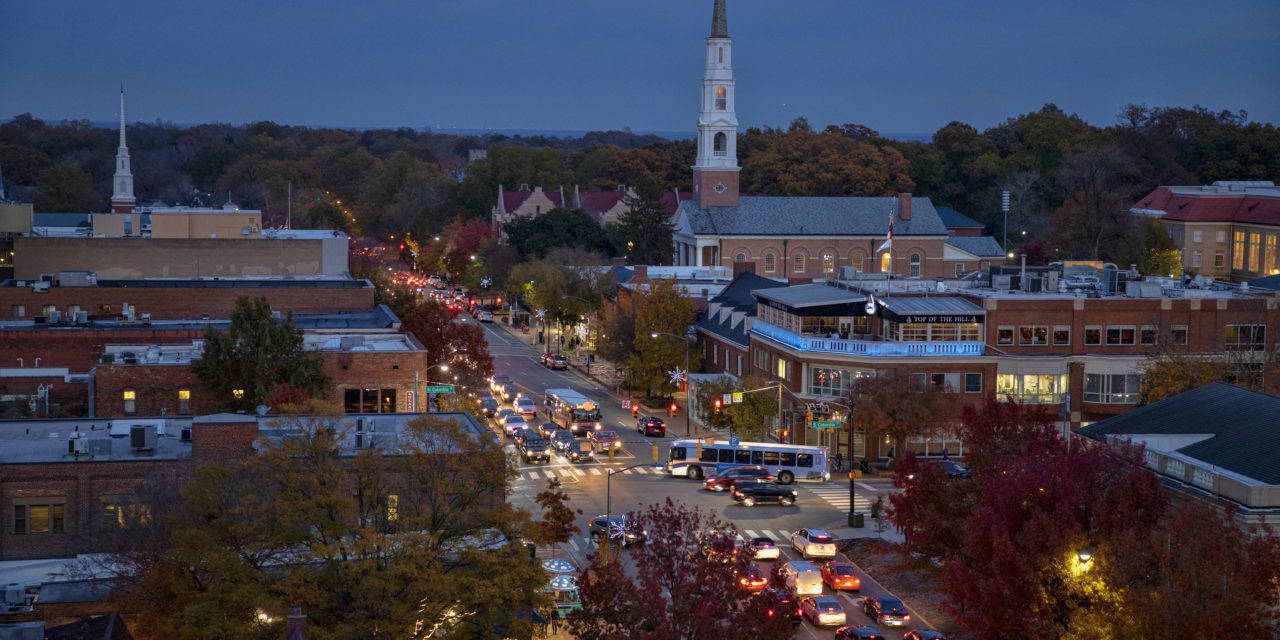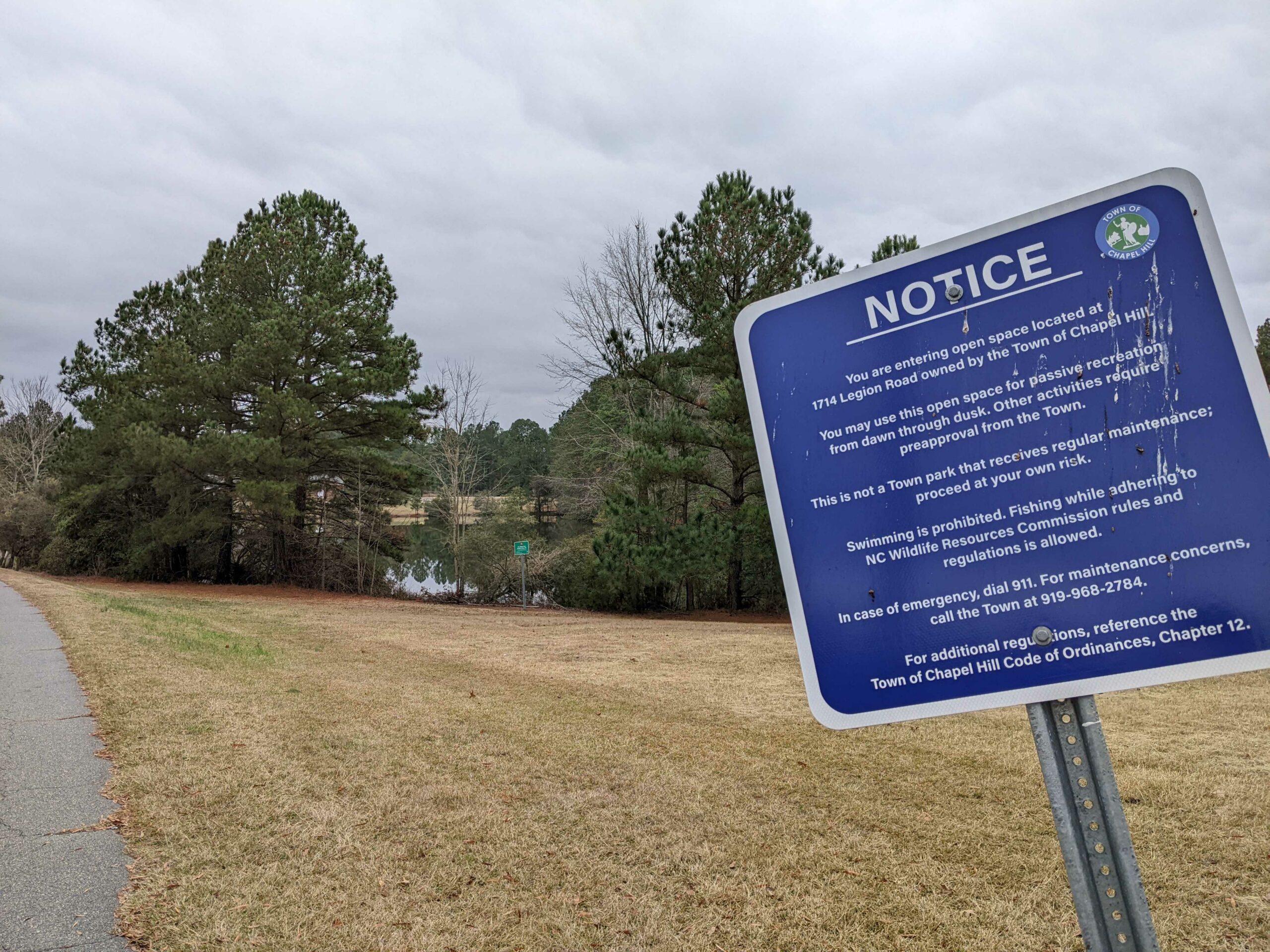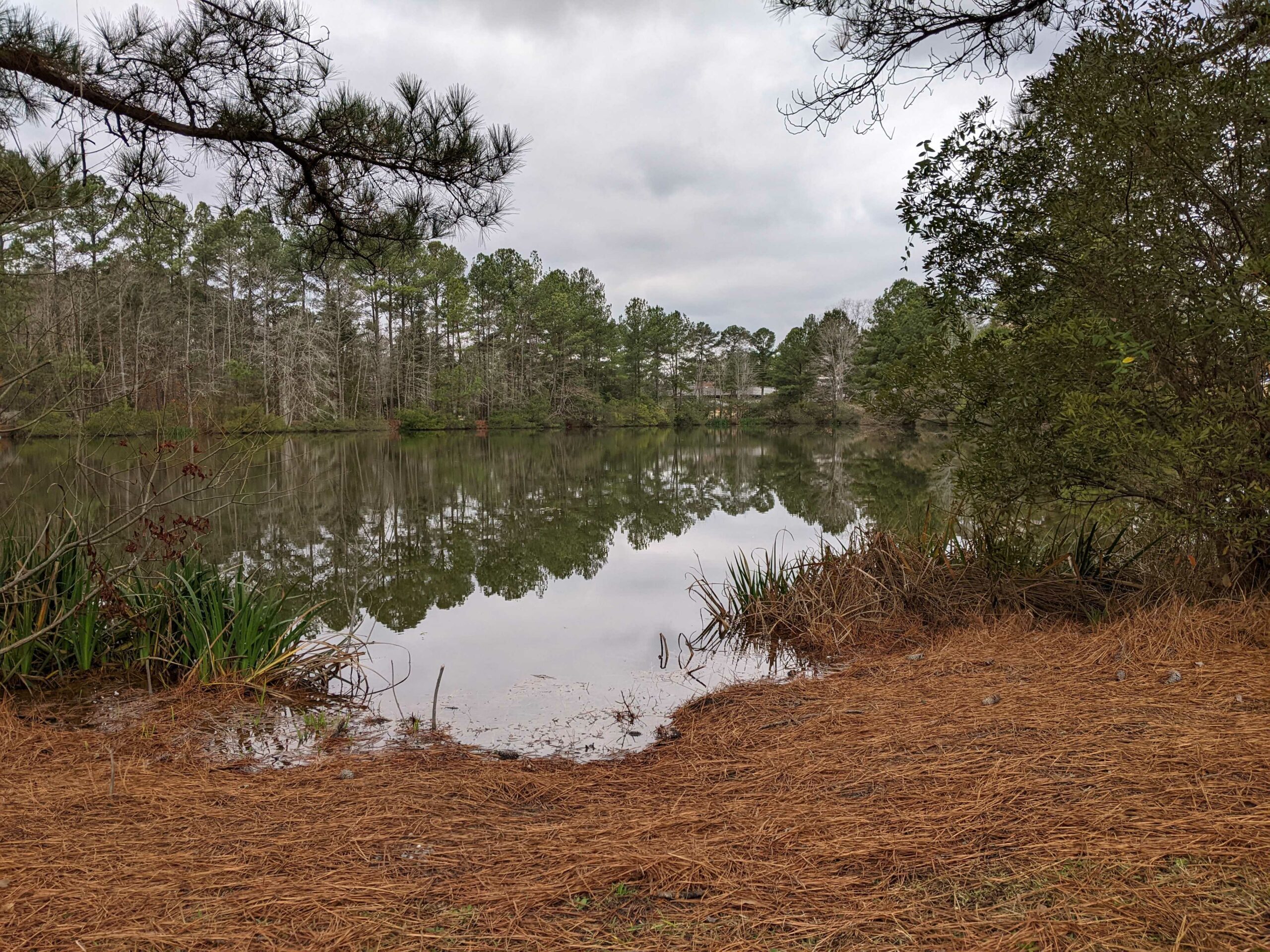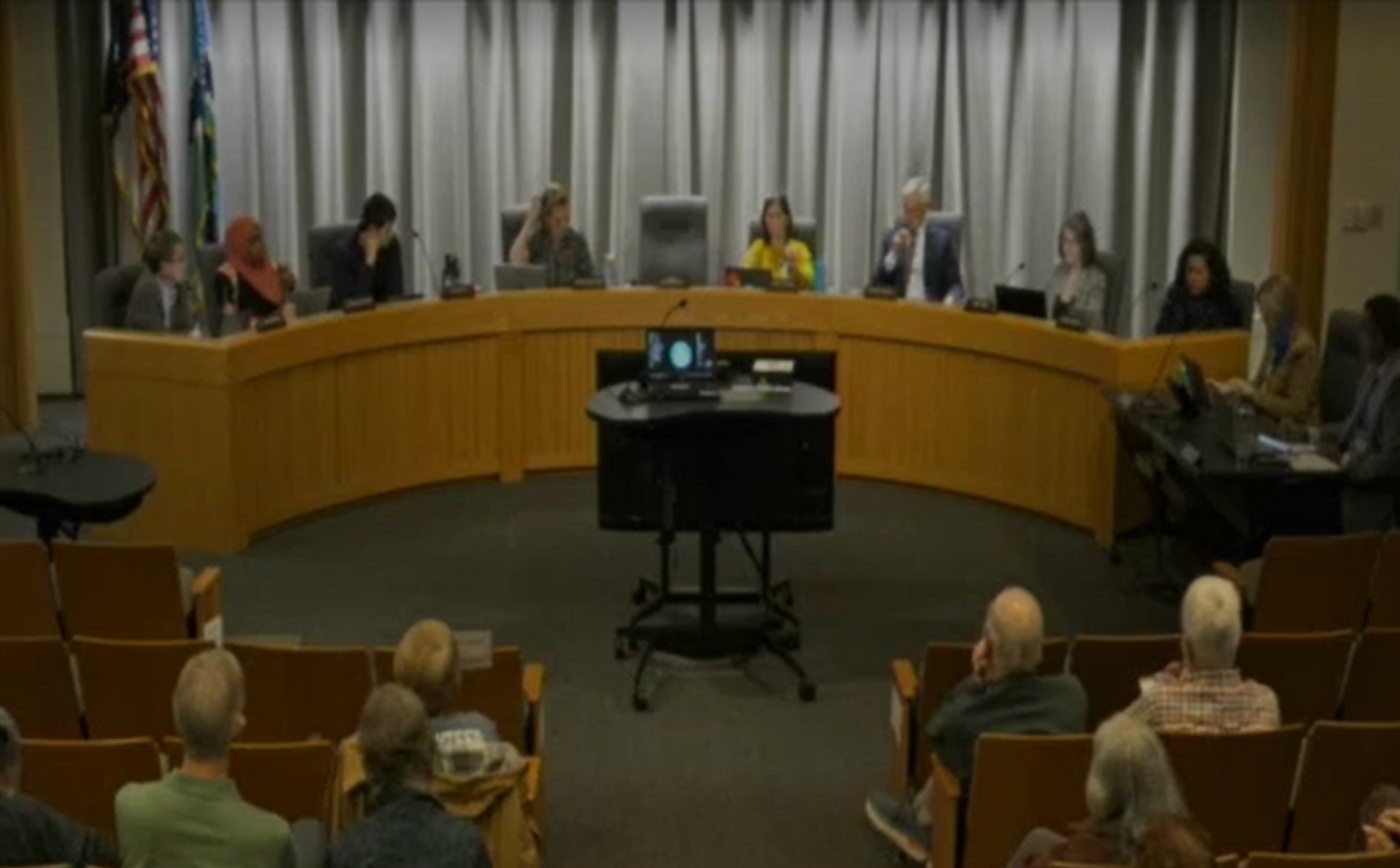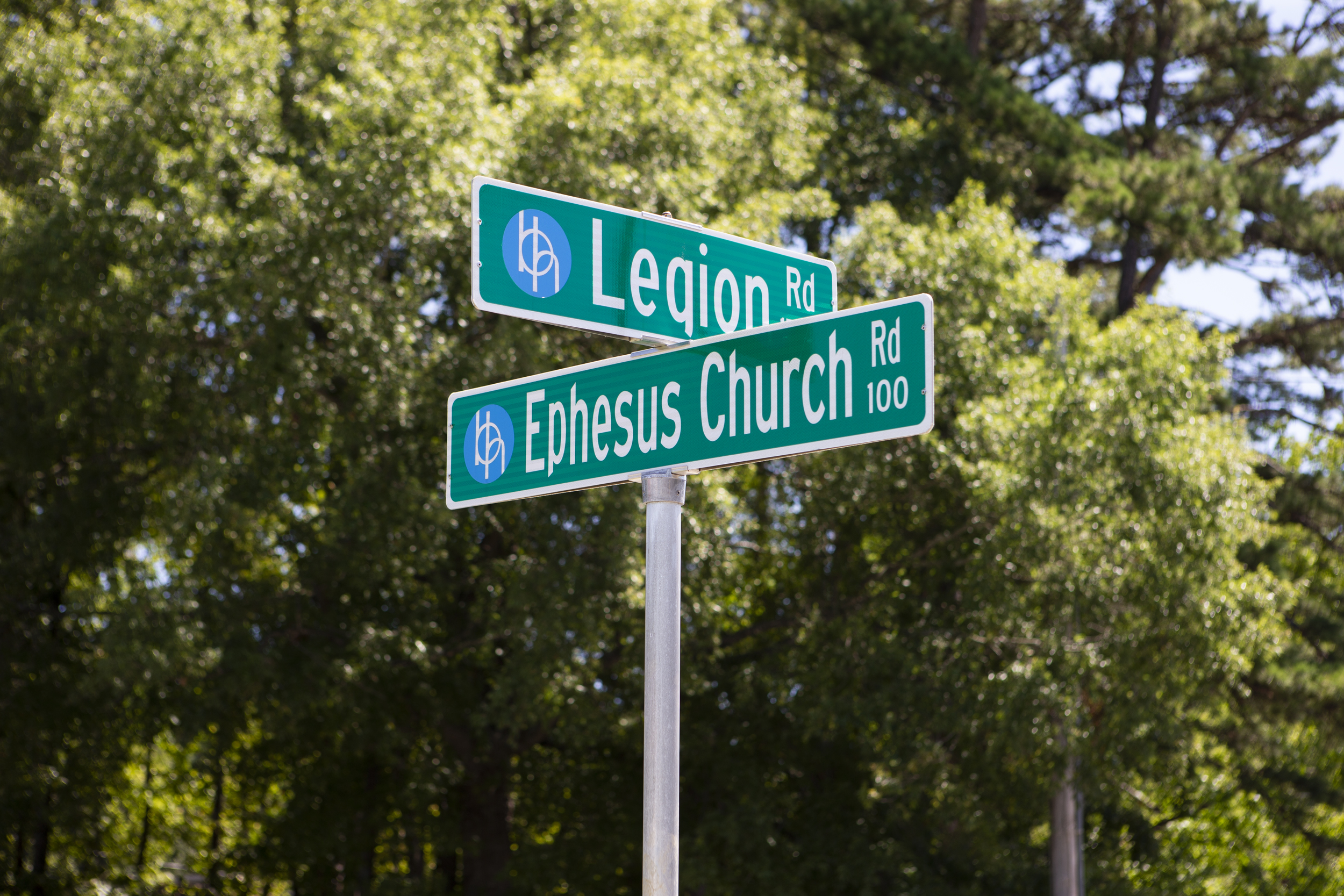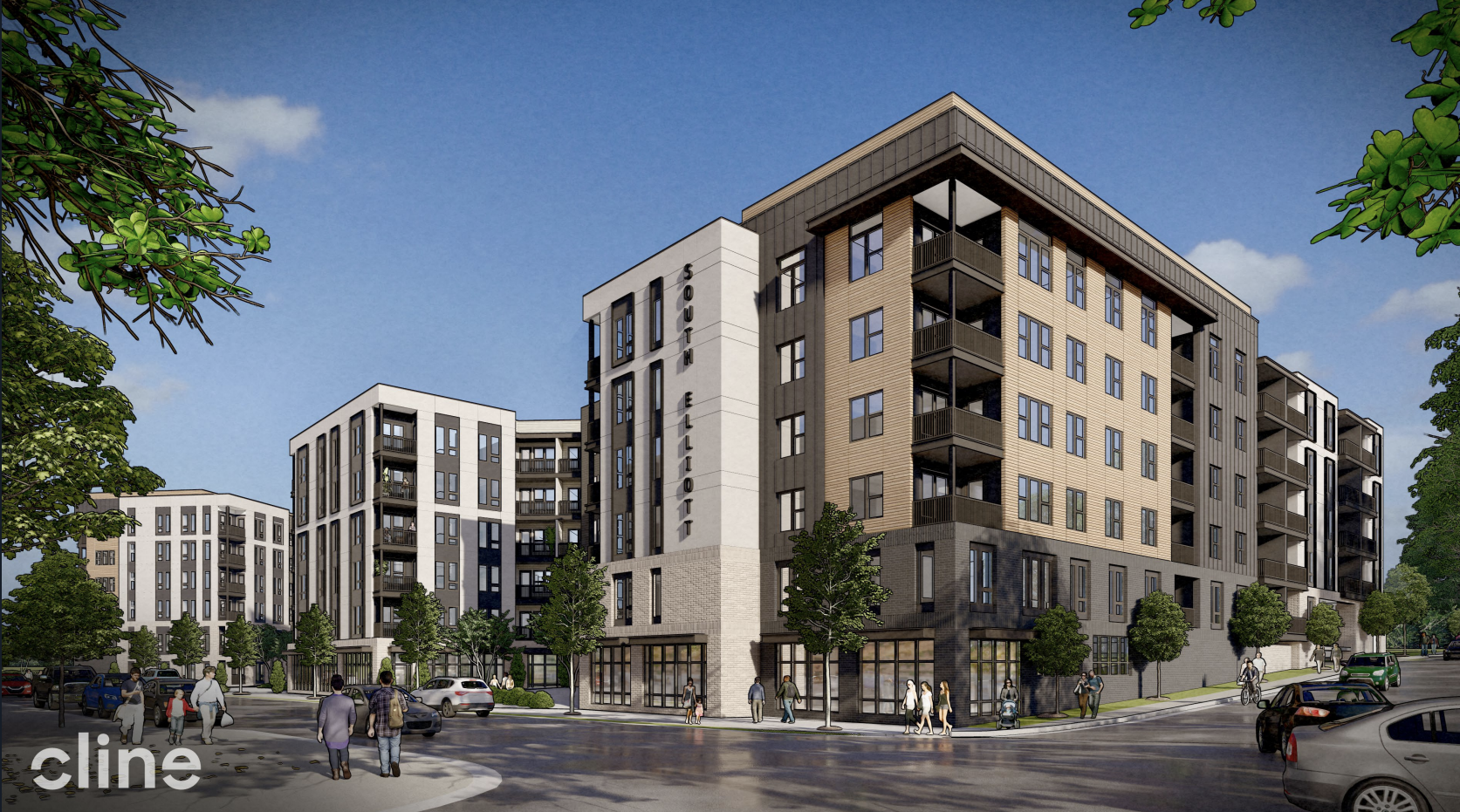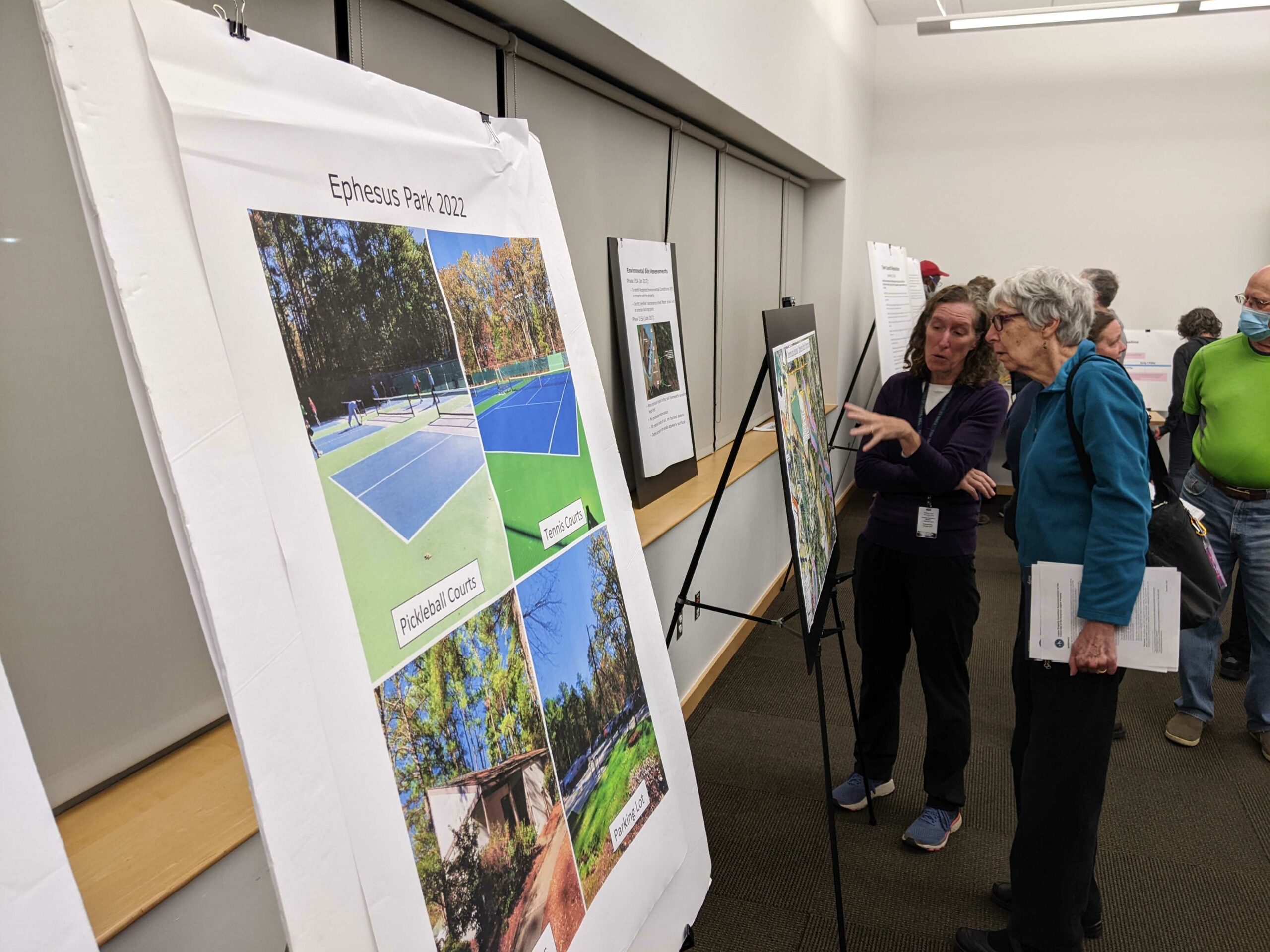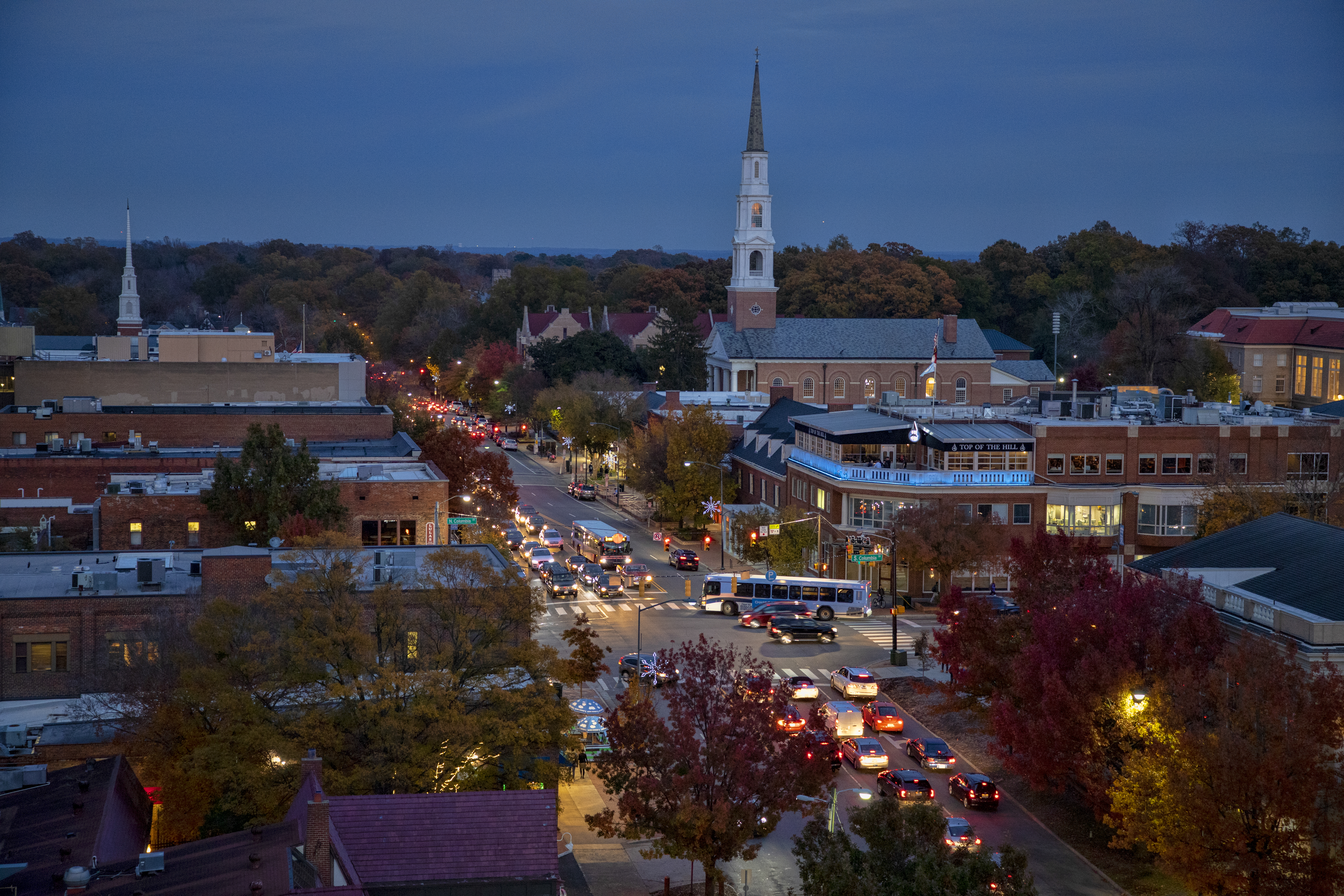While housing demand is an issue across the Triangle, Chapel Hill has long struggled to balance building to demand, keeping its downtown charm and environmental concern. But the town council recently brought on internationally-known consultants to help officials chart a course for their vision of the community, who was presented at open houses last week.
Becca Ferris-Chavez was one of dozens of community members who walked around the information boards on display at the Sheraton Hotel last Thursday. Having lived in Chapel Hill from first grade until college, she said recently trying to find a long-term home that fit her affordability led her to look elsewhere.
“I moved to Chatham County because that’s where we could afford as young adults,” Ferris-Chavez said. “And when we look at the Chapel Hill development in terms of what new construction is coming here, it’s not [affordable]. So, I am one of those people who needed to look elsewhere to find a place for me to live, but to be able to come back and still enjoy Chapel Hill.”
Others attended the Complete Communities Strategy sessions for their own reasons, but all were there to hear the building recommendations from a team of urban planning consultants. The steering committee, which consists of a quartet of leading planners, aims to create tailored guidance for the town government and elected officials to follow in response to the 2021 Housing Report and community members’ top issues.
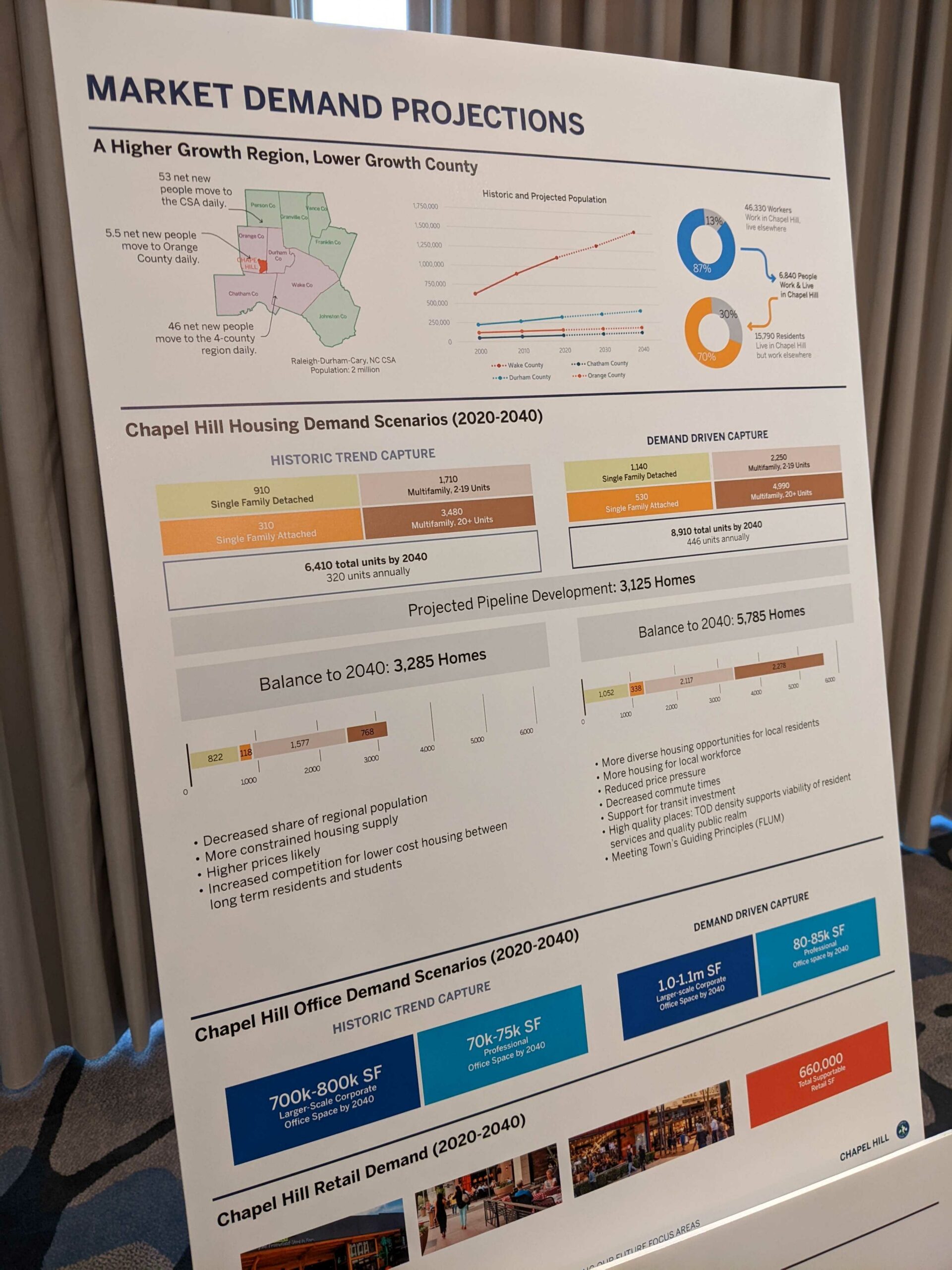
Displays like these filled the Sheraton Hotel in Chapel Hill during open houses on September 15 and 16 for the Complete Community Strategy.
Jennifer Keesmaat, one of the project leaders and the CEO of The Keesmaat Group, described the process this summer as “a fast-moving train” as the team compiled suggestions on how Chapel Hill can become a “complete community.”
The urban planner depicted complete communities as ones with a diversity of housing types, including density of middle-income and affordable options for residents, in both existing and new neighborhoods. But Keesmaat stressed that the vision for complete communities is not simply about constructing more buildings.
“This is a really critical idea to overcome: that we just want to build housing,” she said. “The goal is to build places that will have longevity over a long period of time. To do so, we’ve created a framework – based on the conversations with [planners], with a variety of stakeholders and also with council members – for complete communities in Chapel Hill.”
To craft guidelines for such achievement, the Complete Community Strategy team identified three objectives for their time with the town: start building more consensus of where to develop and what matters to residents, exploring opportunities and compromises, and identifying a pilot project.
Keesmaat acknowledged that broad and bold thinking is required to create plans and developments to fit within the existing town’s profile. She said she believes it’s difficult, but necessary.
“It’s an opportunity that allows Chapel Hill to build on its core strengths and into the future in a way that is very distinct,” said Keesmaat. “You can’t copy solutions in Chapel Hill – you can, but you’ll get weird outcomes.”
The working group of planners held conversations with community members in July, August and earlier this month. Keesmaat said from those, the consultants identified four emerging directions nearly everyone wants for the town. The first three are to plan strategically for the future, plan for excellence in the public realm and to expand and create greenways for everyday life.
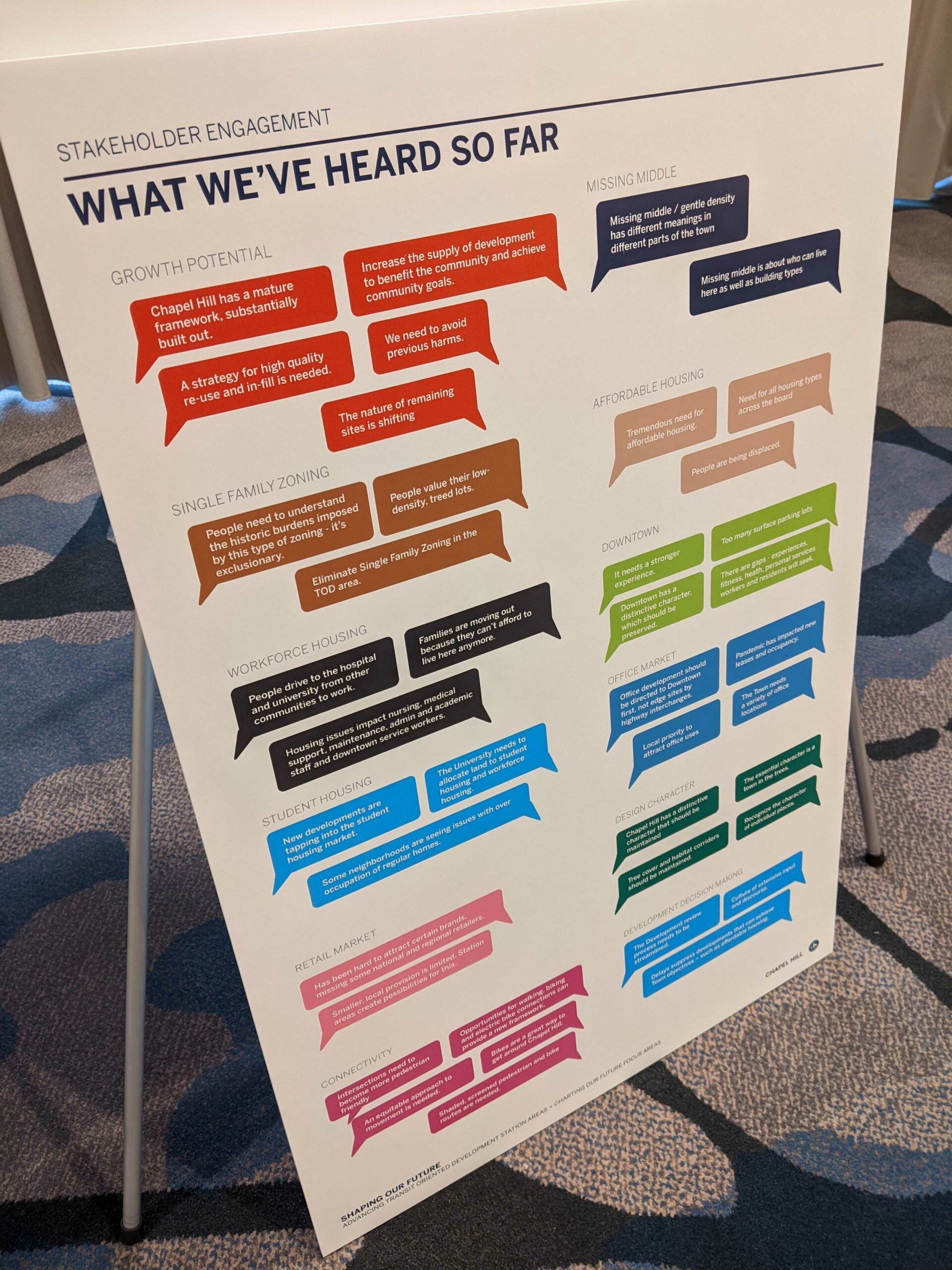
Highlights and key takeaways from the Complete Community Strategy steering committee’s conversations with local leaders.
The final direction of Be Green similarly overlaps with many objectives of the framework, Keesmaat said.
“’Being Green,’ [which is] walking, cycling, doing things in a neighborhood walkshed, or being able to get on your bike and hop over to another area,” she said, “[means] you’re going to have to add more housing to deliver on that. Being green is in alignment with your objective of being a more inclusive town, in providing more housing, not less.”
After the presentation, Chapel Hill Town Council member Jess Anderson said she appreciates the recommendation how the town must make changes with the understanding of how components are tied together.
“It’s the density of housing along with the greenways, along with the ways of getting people out of their cars, along with the sustainability, along with the diverse mix of housing that leads to this kind of inclusive culture that we really want to be,” said Anderson. “We want that to be who we are – we’re not there yet, but I think we have the intention.”
The steering committee will finalize its visioning plan and recommendations to Chapel Hill at the end of October. That’s also when the plan suggests finding a pilot project for the town to test these strategies. Anderson said while she has no idea what that is right now, she’s excited to see how community conversations drive what will be considered.
“What we intend to do,” she said, “is have this pilot project emerge from those back-and-forths, those struggles, this coming to consensus around ‘maybe this isn’t exactly what I wanted, but maybe I can live with it because I’m getting a lot of what I want and it’s healthy for the whole community, not just me.’ I think the pilot process is really meant to be something that shows the community that we’re moving in a different direction.”
Ferris-Chavez said while she appreciates the addressing of hard truths in her hometown, she’s waiting to celebrate until change actually happens.
“You can clearly see that there’s enthusiasm and there’s lots of ideas, which is positive. But when you have deadlines of 2040 and 2050, it’s not very encouraging for me who wants to see this change now. I don’t think that [I], my friends or other young professionals are going to wait and see what happens. They’re going to go where the excitement is.”
The Complete Communities Strategy will have another presentation to the Chapel Hill Town Council on Wednesday, September 28.
Materials from the open houses, as well as the community conversation sessions and prior presentations, can be found on the Complete Community web page on the Town of Chapel Hill website.
Photo via Town of Chapel Hill.
Chapelboro.com does not charge subscription fees, and you can directly support our efforts in local journalism here. Want more of what you see on Chapelboro? Let us bring free local news and community information to you by signing up for our biweekly newsletter.

